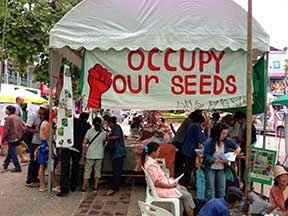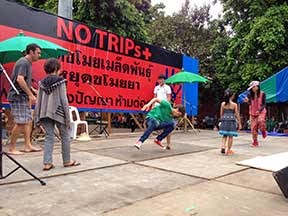In regards to agriculture: there are large corporate producers of food that stand to gain from the EU FTA, since they can ship their produce to Europe tax-free. The chicken and shrimp industries will gain, but other smaller farmers will not benefit from such an agreement. As what happens in the developed world, to earn a decent income, farmers must buy in to the corporate method of food production. This means they purchase seed, fertilizer, and pesticides from the agricultural supplier, and in return their produce is sold to the corporate distributor. The distributor will not buy produce from farmers who are not in their system. Farmers who want to cultivate a wider range of varieties of, say, rice or chickens, will not be able to sell their produce, so why do it? The danger for the future is this narrowing of the gene pool to a few strains means total dependence on a system that, if something goes wrong, everyone will go hungry. The push-back is to allow farmers to be in control of what they grow, how they grow it, and ensure a wide variety of produce reaches the consumer. Besides, variety is the spice of life!
So the protest was held by Thai farmers and medical professions who foresee the cost of food and drugs increasing.
It was a sweltering day in Chiang Mai for the walk to the 5-star hotel Le Meridien where the negotiations were taking place. The goal was to give the negotiators a letter outlining the issues Thai farmers and medical suppliers see as sticking points.
Pun Pun has a stake in this adventure, so we were there for support. It was a gentle protest. I mean, Thai farmers? What will they do? Throw rice at police?
It was peaceful.
It made the front page of the Bangkok Post:
Here's the story:
http://m.bangkokpost.com/topstories/370386
On a more personal note, I took photos. Here they are:
 |
| Poster at our booth |
 |
| Slogan: Occupy our seeds |
 |
| Solidarity |
 |
| Giving away Pun Pun seeds at the protest |
 |
| Break dancing entertainment at the event |
 |
| Audience enjoying the entertainment |
 |
| Protest banner |
 |
| Gearing up for the protest walk |
 |
| Walking to Le Meridien Hotel |
 |
| About 5,000 protesters joined the walk |
 |
| About 500 Riot Police guarding the hotel |
 |
| Line between the protestors and the hotel. The event was peaceful |
 |
| Sitting and waiting for the EU negotiator to come out and accept the letter of protest |
 |
| Life is not for sale: reference to patented organisms developed by corporations |
It was a fun day, but more importantly, mission accomplished. The negotiator came out to greet the crowd and accepted the letter of protest.

No comments:
Post a Comment